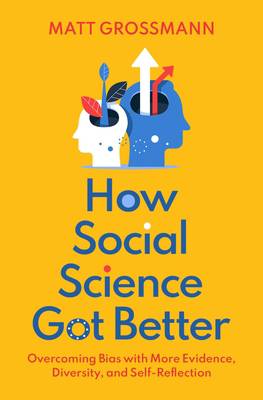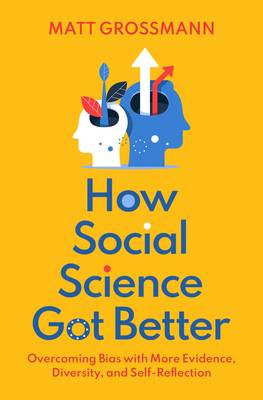
En raison d'une grêve chez bpost, votre commande pourrait être retardée. Vous avez besoin d’un livre rapidement ? Nos magasins vous accueillent à bras ouverts !
- Retrait gratuit dans votre magasin Club
- 7.000.000 titres dans notre catalogue
- Payer en toute sécurité
- Toujours un magasin près de chez vous
En raison de la grêve chez bpost, votre commande pourrait être retardée. Vous avez besoin d’un livre rapidement ? Nos magasins vous accueillent à bras ouverts !
- Retrait gratuit dans votre magasin Club
- 7.000.0000 titres dans notre catalogue
- Payer en toute sécurité
- Toujours un magasin près de chez vous
How Social Science Got Better
Overcoming Bias with More Evidence, Diversity, and Self-Reflection
Matt Grossmann
Livre relié | Anglais
56,95 €
+ 113 points
Description
It seems like most of what we read about the academic social sciences in the mainstream media is negative. The field is facing mounting criticism, as canonical studies fail to replicate, questionable research practices abound, and researcher social and political biases come under fire. In response to these criticisms, Matt Grossmann, in How Social Science Got Better, provides a robust defense of the current state of the social sciences. Applying insights from the philosophy, history, and sociology of science and providing new data on research trends and scholarly views, he argues that, far from crisis, social science is undergoing an unparalleled renaissance of ever-broader understanding and application. According to Grossmann, social science research today has never been more relevant, rigorous, or self-reflective because scholars have a much better idea of their blind spots and biases. He highlights how scholars now closely analyze the impact of racial, gender, geographic, methodological, political, and ideological differences on research questions; how the incentives of academia influence our research practices; and how universal human desires to avoid uncomfortable truths and easily solve problems affect our conclusions. Though misaligned incentive structures of course remain, a messy, collective deliberation across the research community has shifted us into an unprecedented age of theoretical diversity, open and connected data, and public scholarship. Grossmann's wide-ranging account of current trends will necessarily force the academy's many critics to rethink their lazy critiques and instead acknowledge the path-breaking advances occurring in the social sciences today.
Spécifications
Parties prenantes
- Auteur(s) :
- Editeur:
Contenu
- Nombre de pages :
- 352
- Langue:
- Anglais
Caractéristiques
- EAN:
- 9780197518977
- Date de parution :
- 06-09-21
- Format:
- Livre relié
- Format numérique:
- Genaaid
- Dimensions :
- 160 mm x 236 mm
- Poids :
- 657 g

Les avis
Nous publions uniquement les avis qui respectent les conditions requises. Consultez nos conditions pour les avis.






